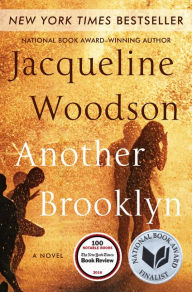
If you follow my reviews, you know I’ve only just read (and struggled with) Hanya Yanagihara’s A Little Life. And without knowing how similar it would be thematically, I picked up Jacqueline Woodson’s Another Brooklyn. It’s the first book of hers I’ve read because she writes primarily young adult and middle grade books, and I never had the occasion to read one. But Another Brooklyn is for adults, and I hope she chooses to write more of them.
This is a very quick read, and not surprising given her experience as a poet as well as a novelist, much of it feels like poetry. In that sense, it’s the polar opposite of A Little Life because Woodson’s novel is a model of precision and concision. She accomplishes as much in 170 pages as A Little Life does in 800+.
The story is about four African-American friends who grow up together in 1970s Brooklyn. The narrator, August, started life in Tennessee but moved to Brooklyn when she was roughly eight, and much of the rest of the book explores her coming to terms with the loss of her mother.
She befriends three other girls from the neighborhood (Angela, Gigi, and Sylvia) and they are inseparable for years. The girls grow up “on the edge of poverty,” and we see them contest with poor treatment either at home or by men in the community, with identity, puberty and boys, sexual exploration, prostitution and drugs, betrayal and loss, as well as death, mental illness, and suicide. It covers an astounding range of troubles in such a short work.
But ultimately the book is about memory. And this is where it reminds me of another wonderful short work of fiction, narrated in first person, about growing up and struggling to understand—Sandra Cisneros’s The House on Mango Street. In both works, the narrator is clearly older, but looking back at her past to make sense of things she couldn’t understand fully as they happened. It’s not a coincidence that I loved Cisneros’s work, too.
Another Brooklyn is wonderful, touching, eloquent, poignant, and with just enough mystery to keep you flipping the pages quickly. I read this in two very brief sessions and only stopped after the first one because I started it too late in the evening and had to sleep before work. Read this one. It will touch you.
This is a very quick read, and not surprising given her experience as a poet as well as a novelist, much of it feels like poetry. In that sense, it’s the polar opposite of A Little Life because Woodson’s novel is a model of precision and concision. She accomplishes as much in 170 pages as A Little Life does in 800+.
The story is about four African-American friends who grow up together in 1970s Brooklyn. The narrator, August, started life in Tennessee but moved to Brooklyn when she was roughly eight, and much of the rest of the book explores her coming to terms with the loss of her mother.
She befriends three other girls from the neighborhood (Angela, Gigi, and Sylvia) and they are inseparable for years. The girls grow up “on the edge of poverty,” and we see them contest with poor treatment either at home or by men in the community, with identity, puberty and boys, sexual exploration, prostitution and drugs, betrayal and loss, as well as death, mental illness, and suicide. It covers an astounding range of troubles in such a short work.
But ultimately the book is about memory. And this is where it reminds me of another wonderful short work of fiction, narrated in first person, about growing up and struggling to understand—Sandra Cisneros’s The House on Mango Street. In both works, the narrator is clearly older, but looking back at her past to make sense of things she couldn’t understand fully as they happened. It’s not a coincidence that I loved Cisneros’s work, too.
Another Brooklyn is wonderful, touching, eloquent, poignant, and with just enough mystery to keep you flipping the pages quickly. I read this in two very brief sessions and only stopped after the first one because I started it too late in the evening and had to sleep before work. Read this one. It will touch you.
 RSS Feed
RSS Feed
